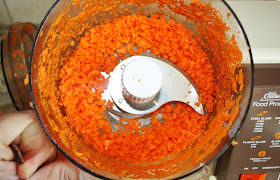I start by preparing my vegetables. The goal is a fine dice. On vegetables like onion or bell pepper, I chop, using a knife. For carrots, I prefer the food processor.
Process until you have a fine dice.
Then squeeze as much liquid from the vegetables as you can. Good quality paper towels work good for this.
Scatter the vegetables onto baking trays, that have been lined with parchment paper. Keep in mind you are dehydrating. You don't want to overload your trays. A single layer is all you want, with room for the vegetables to dry out.
Place the trays in the center of the oven.
Using your convection oven, set the temperature to the lowest setting.
Bake for 1 hour, giving a stir at the 30 minute mark.
Finish the drying process, by air drying, indoors, for a few days, making sure the vegetables are completely dry. If you are in the middle of a California heat wave, feel free to set the vegetables out in the sun, until dry.
Since the carrots are still drying, I will show you the bell peppers fully dehydrated.
Keep dehydrated vegetables in an airtight container. I use dehydrated bells and carrots in a home made version of Good Season's Italian Dressing.











Dehydrated beans can be frozen and stored indefinitely; you can also use dehydrated beans to make a nice warm bowl of soup and some bean stew in half the time!
ReplyDeleteDehydrated beans